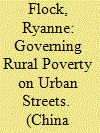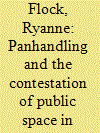| Srl | Item |
| 1 |
ID:
192182


|
|
|
|
|
| Summary/Abstract |
This study investigates how discourses on panhandling intertwine with the governance of beggars on China's urban streets. It focuses on local policy implementation in Guangzhou city, led by the bureau of civil affairs along with its centres for “custody and repatriation” and “assistance stations.” The study aims to understand how the state regulates panhandling and engages with beggars in public spaces. Exploring the internal logic of the state's approach and how it has changed during the 40 years of reform, it also considers the junctures at which contradictions and conflicts arise. Based on fieldwork data (2011 to 2014) and the analysis of government documents, yearbooks, academic and mass media discourses, I argue that the state's treatment of panhandlers poses a conundrum as welfare measures conflict with control. While several layers of state regulation and actors contradict each other and create grey areas of state-induced informality, people who beg for alms are continuously criminalized and excluded from public space.
|
|
|
|
|
|
|
|
|
|
|
|
|
|
|
|
| 2 |
ID:
131817


|
|
|
|
|
| Publication |
2014.
|
| Summary/Abstract |
Urban public space is a product of contestations by various actors. This paper focuses on the conflict between local level government and beggars to address the questions: How and why do government actors refuse or allow beggars access to public space? How and why do beggars appropriate public space to receive alms and adapt their strategies? How does this contestation contribute to the trends of urban public space in today's China? Taking the Southern metropolis of Guangzhou as a case study, I argue that beggars contest expulsion from public space through begging performances. Rising barriers of public space require higher investment in these performances, taking even more resources from the panhandling poor. The trends of public order are not unidirectional, however. Beggars navigate between several contextual borders composed by China's religious renaissance; the discourse on deserving, undeserving, and dangerous beggars; and the moral legitimacy of the government versus the imagination of a successful, "modern," and "civilised" city. This conflict shows the everyday production of "spaces of representation" by government actors on the micro level where economic incentives merge with aspirations for political prestige.
|
|
|
|
|
|
|
|
|
|
|
|
|
|
|
|